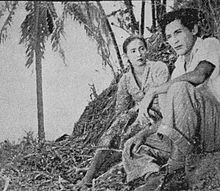
Lewat Djam Malam is a 1954 Indonesian film directed and produced by Usmar Ismail and written by Asrul Sani. Widely regarded as a classic of Indonesian cinema, the film follows an ex-soldier in his vigilante actions against corruption.

Djadoeg Djajakusuma was an Indonesian film director and promoter of traditional art forms. Born to a nobleman and his wife in Temanggung, Central Java, Djajakusuma became interested in the arts at a young age, choosing to pursue a career in theatre. During the Japanese occupation from 1943 to 1945 he was a translator and actor, and in the four-year national revolution which followed he worked for the military's educational division, several news agencies, and in drama.
Tjitra is a 1949 Indonesian film directed by Usmar Ismail for the Dutch-owned production house South Pacific. Starring Raden Sukarno, Nila Djuwita, and Raden Ismail, it follows a man named Harsono who takes a woman's virginity then flees to the city, where he is caught up in a murder case. Ismail's directorial debut, Tjitra was made while its director was still a member of the Indonesian Army. He later disavowed the film, as he felt he had had too little creative input.

Gadis Desa is a 1949 comedy from what is now Indonesia written and directed by Andjar Asmara. Starring Basuki Djaelani, Ratna Ruthinah, Ali Joego, and Djauhari Effendi, it follows the romantic hijinks of a village girl who is taken to be a rich man's second wife. The film, produced by a Dutch-run company, is recognised as the first in which future "father of Indonesian film" Usmar Ismail was involved.

Darah dan Doa is a 1950 Indonesian war film directed and produced by Usmar Ismail, telling the story of the Siliwangi Division and its leader Captain Sudarto on a march to West Java. Following Ismail's Dutch-produced Tjitra (1949), Darah dan Doa is often cited as the first 'Indonesian' film, and the film's first day of shooting – 30 March – is celebrated in Indonesia as National Film Day.

Perfini was an Indonesian film production company, based in Jakarta. It was most productive in Indonesian cinema in the 1950s. Its most notable directors were Usmar Ismail, who directed its first film Darah dan Doa (1950), and D. Djajakusuma. By 1966 it reportedly had its own studio, a "20-by-30-meter building large enough for construction of a couple of modest sets".

Enam Djam di Jogja is a 1951 Indonesian film directed by Usmar Ismail. It was the second film to be produced under the PERFINI banner. Detailing the show of force in which the Indonesian republican army retook the capital at Yogyakarta for six hours, the film utilised much of the cast and crew from Ismail's previous work Darah dan Doa (1950). The film was a success in Indonesia and continued to be screened on the state television channel into the 1980s, even after two further films about the event were released.

Air Mata Iboe is a 1941 drama film from the Dutch East Indies directed and written by Njoo Cheong Seng. Starring Fifi Young, Rd Ismail, Ali Sarosa, and Ali Joego, it followed a mother who raises her children lovingly but is ultimately betrayed by her eldest sons when she falls upon hard times. The film, billed as a "musical extravaganza," featured a soundtrack by R. Koesbini, and an eponymous title song written by Njoo.

Panggilan Darah is a 1941 film from the Dutch East Indies written and directed by Sutan Usman Karim and produced by Tjho Seng Han for Oriental Film. The black-and-white film starred Dhalia and Soerip as orphaned sisters trying to make a living in the colonial capital of Batavia before moving to Kudus to work at a clove cigarette factory.

Srigala Item is a 1941 film from the Dutch East Indies that was directed by Tan Tjoei Hock and produced by The Teng Chun for Action Film. Starring Hadidjah, Mohamad Mochtar, and Tan Tjeng Bok, the film's plot – inspired by Zorro – follows a young man who became a masked vigilante to take revenge against his conniving uncle. Srigala Item was a commercial success, which Misbach Yusa Biran credits to the plot's use for escapism. A copy of the black-and-white film, which featured kroncong music, is stored at Sinematek Indonesia.

Elly Joenara was an Indonesian film actress who later became a producer. She was the wife of producer Djamaluddin Malik.
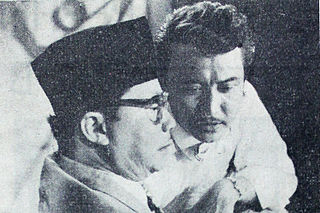
Tamu Agung is a 1955 Indonesian dramatic comedy film directed by Usmar Ismail. It stars Cassin Abbas, Nina Amora, M. Pandji Anom, and Chitra Dewi. The satirical political comedy, about the anticipation of the visit of a dignitary to a small isolated village in East Java, was critically acclaimed, although it was disliked by the government. The film, produced under the Perfini banner, was shot by cinematographer Max Tera. This movie is set in the modern day.

Rara Patma Dewi Tjitrohadiseikusumo, best known under her stage name Chitra Dewi, was an Indonesian actress and director. She was noted for her roles in Usmar Ismail's films of the 1950s, appearing in films such as Tamu Agung, Tiga Dara, and Pedjuang, although she remained active in cinema until 1993 and won a Citra Award for Best Supporting Actress at the 1979 Indonesian Film Festival for Gara-gara Isteri Muda. Dewi also had a brief stint film directing in 1971, making her one of only six Indonesian women to direct a film before 1998.

Basoeki Resobowo was an Indonesian painter. Born to a transmigrant father in Sumatra, from a young age he showed interest in the visual arts but was taught to be a teacher. After a short time at a Taman Siswa school in Batavia, he studied design and worked as a surveyor while producing sketches and book covers. He only acted in a single film, Kedok Ketawa, but remained close to the acting community, first as a set designer during the Japanese occupation of the Dutch East Indies then for Perfini in the early 1950s.
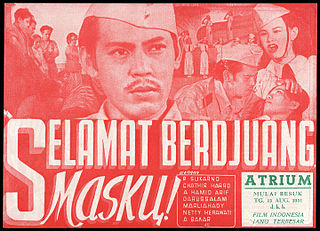
Selamat Berdjuang, Masku! is a 1951 Indonesian film directed by R.H. Andjar Subyanto and starring Raden Sukarno and Marlia Hardi. It follows a former guerrilla leader who must pursue his love despite the interference of his former comrades.
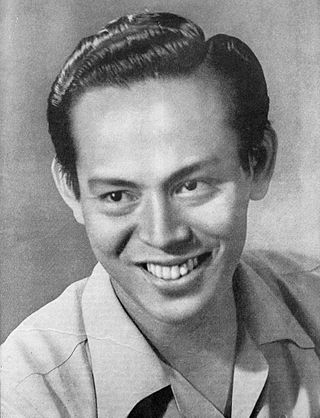
Raden Soekarno, better known as Rendra Karno, was an Indonesian actor. Born in Kutoarjo, Central Java, Soekarno entered the film industry in 1941, making his debut appearance in Union Films' Soeara Berbisa. Over the next forty years he appeared in more than fifty films. He was also involved in the theatre during the Japanese occupation of the Dutch East Indies and the Indonesian National Revolution. For his role in 1962's Bajangan di Waktu Fadjar, he was named best supporting actor at the 1963 Asian Film Festival in Tokyo.
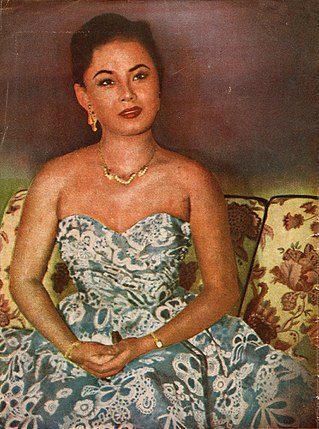
Netty Herawaty was an Indonesian actress who made more than fifty films between 1949 and 1986.

Darussalam was an Indonesian actor who appeared in more than seventy films in his forty-year career. Born in Bengkulu, he studied to be nurse before migrating to theatre during the Japanese occupation of the Dutch East Indies, marrying Netty Herawaty while with the troupe Irama Masa. The couple spent the remainder of the occupation and the ensuing revolution touring the archipelago with a number of troupes. In 1949, Darussalam and Herawaty made their feature film debut in Fred Young's Saputangan, appearing in seven further Young productions before migrating to Djamaluddin Malik's Persari. During their eight years with the company, Darussalam and Herawaty travelled to the Philippines and Singapore and found popularity among audiences, though Darussalam remained in his wife's shadow.

Tiga Dara is a 1957 Indonesian musical drama film starring Chitra Dewi, Mieke Wijaya, and Indriati Iskak. Directed by Usmar Ismail for Perfini, the film follows three sisters who live with their father and grandmother. When the eldest sister, Nunung, shows no interest in marrying, her family tries unsuccessfully to find a husband for her. Nunung initially rejects the advances of a young man named Toto, who instead dates her younger sister. However, when he becomes jealous and travels from Jakarta to Bandung to profess his love, she agrees to marry him.

The South Pacific Film Corporation (SPFC) was a Dutch government sponsored feature film producer in the Dutch West Indies. A separate unit produced newsreels in Indonesia. The production company was sponsored under the Netherlands Indies Civil Administration. It was preceded by the Netherlands Indies Government Information Service.
